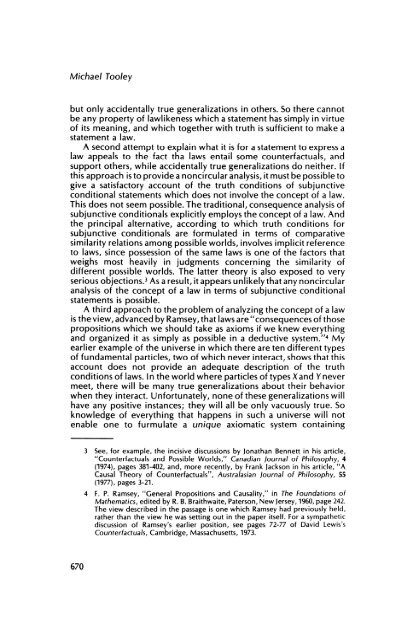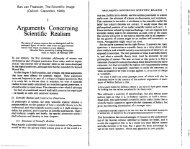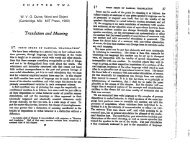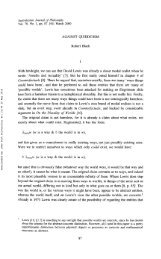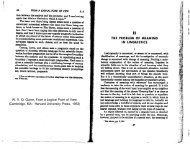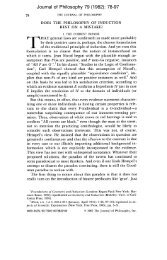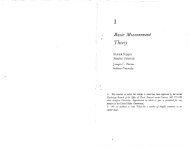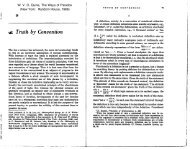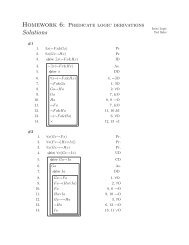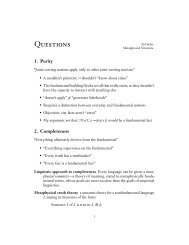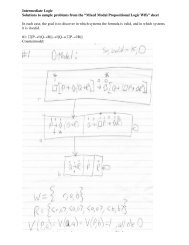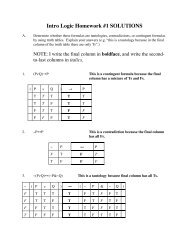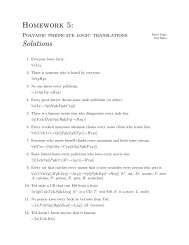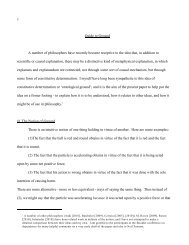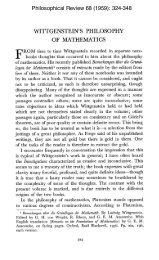Tooley - the nature of laws.pdf - Ted Sider
Tooley - the nature of laws.pdf - Ted Sider
Tooley - the nature of laws.pdf - Ted Sider
You also want an ePaper? Increase the reach of your titles
YUMPU automatically turns print PDFs into web optimized ePapers that Google loves.
Michael <strong>Tooley</strong><br />
but only accidentally true generalizations in o<strong>the</strong>rs. So <strong>the</strong>re cannot<br />
be any property <strong>of</strong> lawlikeness which a statement has simply in virtue<br />
<strong>of</strong> its meaning, and which toge<strong>the</strong>r with truth is sufficient to make a<br />
statement a law.<br />
A second attempt to explain what it is for a statement to express a<br />
law appeals to <strong>the</strong> fact tha <strong>laws</strong> entail some counterfactuals, and<br />
support o<strong>the</strong>rs, while accidentally true generalizations do nei<strong>the</strong>r. If<br />
this approach is to provide a noncircular analysis, it must be possible to<br />
give a satisfactory account <strong>of</strong> <strong>the</strong> truth conditions <strong>of</strong> subjunctive<br />
conditional statements which does not involve <strong>the</strong> concept <strong>of</strong> a law.<br />
This does not seem possible. The traditional, consequence analysis <strong>of</strong><br />
subjunctive conditionals explicitly employs <strong>the</strong> concept <strong>of</strong> a law. And<br />
<strong>the</strong> principal alternative, according to which truth conditions for<br />
subjunctive conditionals are formulated in terms <strong>of</strong> comparative<br />
similarity relations among possible worlds, involves implicit reference<br />
to <strong>laws</strong>, since possession <strong>of</strong> <strong>the</strong> same <strong>laws</strong> is one <strong>of</strong> <strong>the</strong> factors that<br />
weighs most heavily in judgments concerning <strong>the</strong> similarity <strong>of</strong><br />
different possible worlds. The latter <strong>the</strong>ory is also exposed to very<br />
serious objections.3 As a result, it appears unlikely that any noncircular<br />
analysis <strong>of</strong> <strong>the</strong> concept <strong>of</strong> a law in terms <strong>of</strong> subjunctive conditional<br />
statements is possible.<br />
A third approach to <strong>the</strong> problem <strong>of</strong> analyzing <strong>the</strong> concept <strong>of</strong> a law<br />
is <strong>the</strong> view, advanced by Ramsey, that <strong>laws</strong> are "consequences <strong>of</strong> those<br />
propositions which we should take as axioms if we knew everything<br />
and organized it as simply as possible in a deductive system/'4 My<br />
earlier example <strong>of</strong> <strong>the</strong> universe in which <strong>the</strong>re are ten different types<br />
<strong>of</strong> fundamental particles, two <strong>of</strong> which never interact, shows that this<br />
account does not provide an adequate description <strong>of</strong> <strong>the</strong> truth<br />
conditions <strong>of</strong> <strong>laws</strong>. In <strong>the</strong> world where particles <strong>of</strong> types Xand Y never<br />
meet, <strong>the</strong>re will be many true generalizations about <strong>the</strong>ir behavior<br />
when <strong>the</strong>y interact. Unfortunately, none <strong>of</strong> <strong>the</strong>se generalizations will<br />
have any positive instances; <strong>the</strong>y will all be only vacuously true. So<br />
knowledge <strong>of</strong> everything that happens in such a universe will not<br />
enable one to furmulate a unique axiomatic system containing<br />
670<br />
3 See, for example, <strong>the</strong> incisive discussions by Jonathan Bennett in his article,<br />
"Counterfactuals and Possible Worlds," Canadian Journal <strong>of</strong> Philosophy, 4<br />
(1974), pages 381-402, and, more recently, by Frank Jackson in his article, "A<br />
Causal Theory <strong>of</strong> Counterfactuals", Australasian Journal <strong>of</strong> Philosophy, 55<br />
(1977), pages 3-21.<br />
4 F. P. Ramsey, "General Propositions and Causality," in The Foundations <strong>of</strong><br />
Ma<strong>the</strong>matics, edited by R. B. Braithwaite, Paterson, New Jersey, 1960, page 242.<br />
The view described in <strong>the</strong> passage is one which Ramsey had previously held,<br />
ra<strong>the</strong>r than <strong>the</strong> view he was setting out in <strong>the</strong> paper itself. For a sympa<strong>the</strong>tic<br />
discussion <strong>of</strong> Ramsey's earlier position, see pages 72-77 <strong>of</strong> David Lewis's<br />
Counterfactuals, Cambridge, Massachusetts, 1973.


